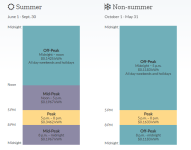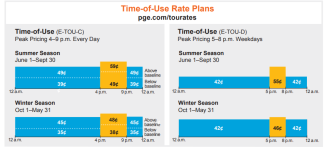Steve Hoch
TVWBB Olympian
Honest question. Can you even get your house down to 70° at night when it's that hot outside?I'm going for a swim. Pool is 86. 30 mins and I'll be chilled enough to sleep.
Honest question. Can you even get your house down to 70° at night when it's that hot outside?I'm going for a swim. Pool is 86. 30 mins and I'll be chilled enough to sleep.
Yes. Temp is 83 outside. I've got R30 attic insulation and a quiet cool attic gable fan so it's not really that hot.Honest question. Can you even get your house down to 70° at night when it's that hot outside?
That's good, those temps work for me too.Yes. Temp is 83 outside. I've got R30 attic insulation and a quiet cool attic gable fan so it's not really that hot.
On hot nights when I can't open windows I'll set AC to 70 then turn it up to 72 when I go to bed
I have an 8KW PV solar system, 24 panels. Solar is a must-have in my situation. My elec costs without Solar would be insane.Not to get off topic, but how many of you run solar panels?
Solar. Owned. 12 panels 4.08kW system. My sell price of excess power is $0.074 kWh and my buy price varies per our summer time of day rates. I’m estimating that I’ll build up credit outside of AC season to substantially reduce my annual electricity costs.Not to get off topic, but how many of you run solar panels?
My Son has them. He says they help offset heating cooling costs and charging his EV.
In this area I think they are sketchy, but out west..
Solar. Owned. 12 panels 4.08kW system. My sell price of excess power is $0.074 kWh and my buy price varies per our summer time of day rates. I’m estimating that I’ll build up credit outside of AC season to substantially reduce my annual electricity costs.
My previous home ran around $1600-1700 a year on electricity costs. New home I’m projecting around $300 annual costs.
All appliances except my tankless water heater and a 36” range cooktop are now electric.


And PGE no longer buys excess power from solar generators, correct? So you have to have a battery system to even make it all worthwhile. PGE has gone insane.Brett has SMUD and I have PG&E. I'm guessing a $1600 annual electric costx from SMUD would be over $ 5K for a PGE customer with the same usage.
SMUDs most expensive peak rate is lower than the PGEs least expensive off-peak rate. PGE customers are adopting solar with battery backup to survive the insanely high rates and frequent power outages.
View attachment 94862
PGE
View attachment 94863
And PGE no longer buys excess power from solar generators, correct? So you have to have a battery system to even make it all worthwhile. PGE has gone insane.
Really depends on the actual dollars cost difference.Oooffffff.
Had the local HVAC shop out (his Dad originally installed this system in '93 when the house was built.) At a minimum, 3 lbs. of R22. No, that ain't happenin'. The furnace is an ~80% efficient, and it'd probably be a good idea to just replace the whole shootin' match at this point, 97% efficient natural gas furnace with a new 2.5 ton AC (think he said 16 seer.)
I asked about heat pumps. According to him, with our electric and gas suppliers here in town, the payoff is a lot longer due to no off hours rate reductions and a few other things. In town, he sets the switchover point to 30 F, outside of town, it's about 5 F. The additional rebates from the energy suppliers and income taxes would offset about half of the heat pump (air to air) premium. The remaining premium would take a long time to pay back from decreased energy usage.
Brands..... He's suggesting either American Standard (which is what we have) or Armstrong for furnace & A/C. Heat pump, he will only sell American Standard.
Oh..... southeastern MN. I expect to see a couple of weeks annually at -10 to -20 F. According to https://energystar.gov, 99% heat design temp is -8 F and the 1% cooling temp is 88 F. A backup heat source is absolutely mandatory here. The house is fairly well insulated, and does have nearly new windows. Photovoltaic panels on the roof and batteries in the basement are just not in the cards right now.
What else do I need to be looking at, what other questions do I need to ask? The heat pump option is attractive from a purely energy efficient standpoint, but the payback looks to be rather long. I can't see just dumping $500 of refrigerant into the system without any idea of where or why it's gone (okay, besides time.)
Slight side note.... I've apparently surprised him by NOT demanding that it be fixed or repaired tomorrow.
The installation premium for the heat pump is on the order of $5k, rebates would bring that down to $2.5-3k.Really depends on the actual dollars cost difference.
$7k difference would be a lot. But it really comes down to the numbers. Heat pumps are better technology and maintain a more consistent temperature so long as the fan is infinite variable speed.
For $3k more I’d buy the heat pump system. But it depends on your actual numbers.
around 2200 sq ft home?My system (I don't recall the SEER rating on the AC but it was the highest one they could install for it's size) and the furnace they installed a 98.5% unit and the whole thing requires a special t/stat to work at max efficiency as it monitors current and predicted weather, and adjusts itself accordingly. Total installed cost was right about $10K
